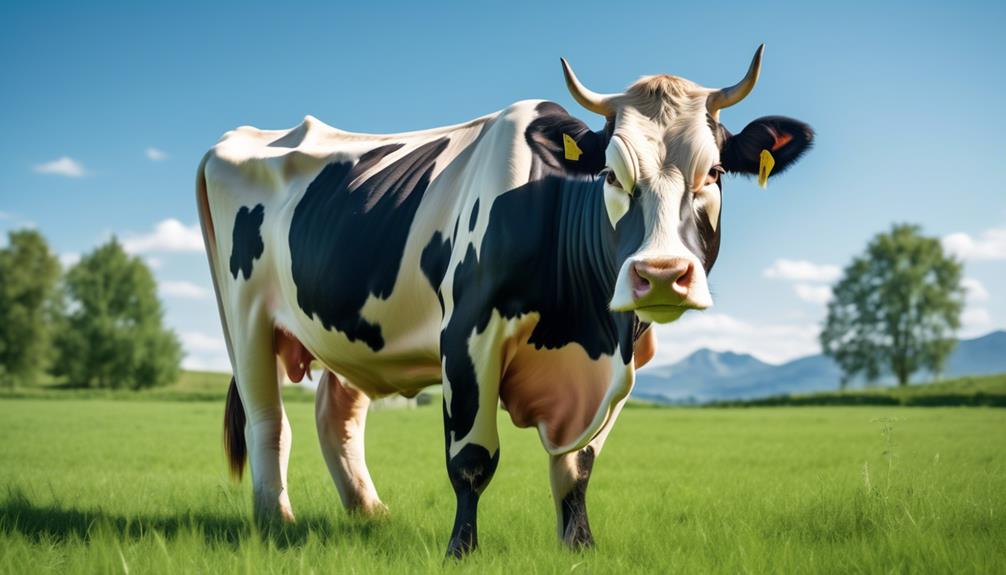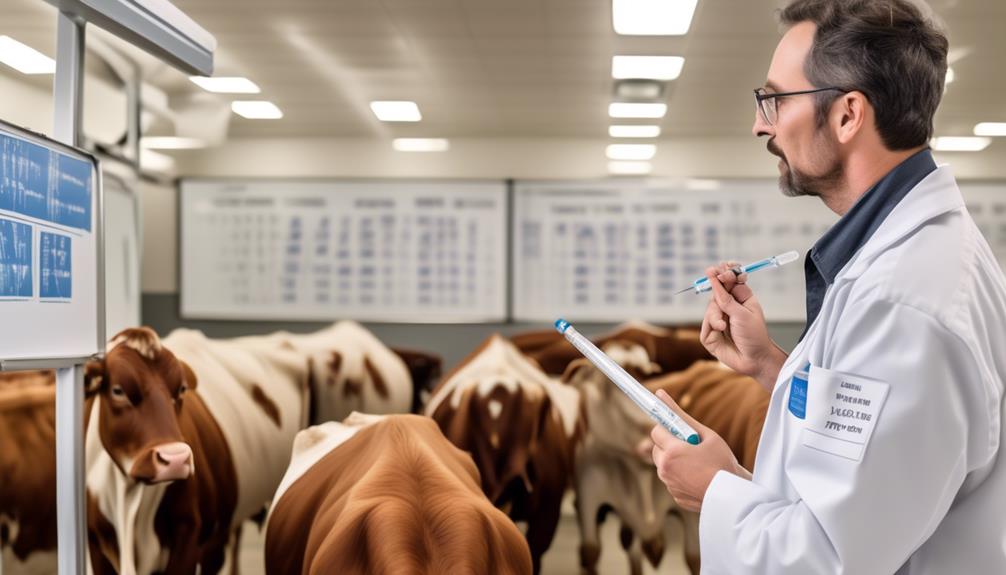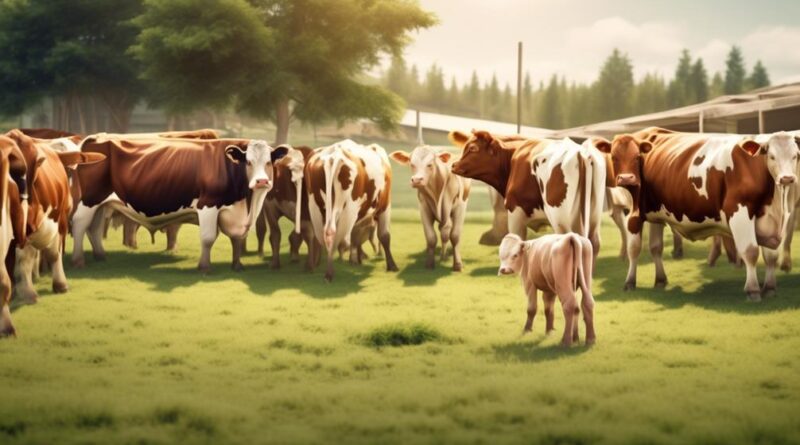Optimizing Cattle Health Through Vaccination Schedules
You've probably experienced the frustration of dealing with an outbreak of bovine respiratory disease (BRD) in your herd despite following a vaccination program. It's a common scenario that many cattle farmers face, but there are ways to optimize your vaccination schedules to prevent such setbacks.
By understanding the specific diseases that pose a threat to your herd and developing a customized vaccination plan, you can significantly improve the overall health and productivity of your cattle.
However, simply administering vaccines is not enough to guarantee success. There are crucial timing strategies and monitoring techniques that can make a significant difference in the effectiveness of your vaccination program.
Understanding the nuances of these strategies can be the key to unlocking the full potential of your herd's health.
Understanding Cattle Vaccination Importance

Understanding the importance of cattle vaccination is crucial for maintaining their health and preventing the spread of diseases within the herd. Vaccination plays a vital role in livestock health management by providing numerous benefits.
One of the key advantages of vaccination is its effectiveness in preventing various diseases that can significantly impact the well-being of cattle. By administering the appropriate vaccines, you can safeguard your herd from potentially devastating illnesses, ultimately reducing the risk of economic losses associated with treatment costs and decreased productivity.
In addition to disease prevention, vaccination also contributes to the overall health and welfare of cattle. It helps in building their immunity against specific pathogens, ensuring that they're better equipped to fight off infections. This proactive approach to livestock health management not only benefits the individual animals but also has a positive impact on the entire herd. By minimizing the prevalence of diseases, vaccination supports a healthier and more robust cattle population, ultimately contributing to the sustainability and productivity of your livestock operation.
Furthermore, incorporating a comprehensive vaccination program into your livestock health management practices can also have broader implications for public health. Certain diseases that affect cattle can pose zoonotic risks, potentially impacting human health. By preventing these diseases through vaccination, you aren't only protecting your cattle but also contributing to the broader community's well-being.
Therefore, understanding the importance and benefits of cattle vaccination is essential for promoting the health, welfare, and productivity of your herd while also addressing public health concerns.
Identifying Key Vaccination Diseases
To effectively protect your cattle from potential illnesses, it's essential to identify the key diseases for which vaccination is crucial. Disease prevention is a critical aspect of maintaining the health and well-being of your herd. By understanding the specific diseases that pose a threat to your cattle, you can develop a targeted vaccination schedule to ensure optimal protection. Identifying key vaccination diseases involves considering various factors such as regional prevalence, the nature of your cattle operation, and the overall goals for herd health.
Herd immunity, which is achieved through widespread vaccination, plays a vital role in protecting cattle populations from contagious diseases. When a large percentage of the herd is immune to a particular disease, it becomes significantly harder for the illness to spread within the group. By identifying and vaccinating against key diseases, you not only protect individual animals but also contribute to the overall health and resilience of the entire herd.
Common key vaccination diseases in cattle include but aren't limited to respiratory diseases such as infectious bovine rhinotracheitis (IBR), bovine viral diarrhea (BVD), and infectious bovine respiratory disease (IBRD). Additionally, clostridial diseases like blackleg and tetanus are crucial to address through vaccination to prevent significant losses in the herd.
Identifying key vaccination diseases is a fundamental step in creating an effective disease prevention strategy for your cattle. By staying informed about prevalent diseases in your region and consulting with a veterinarian, you can make informed decisions to safeguard the health of your herd.
Developing Customized Vaccination Plans

When creating customized vaccination plans for your cattle, consider factors such as the age, breed, and specific health risks of your herd to ensure comprehensive protection. Customized schedules are essential to address the unique needs of your herd and maximize the effectiveness of vaccinations.
Here are some key considerations for developing customized vaccination plans:
- Age: Factor in the age of your cattle when developing vaccination schedules. Calves, for example, may require different vaccinations than adult cattle to address their specific vulnerabilities and immunity levels.
- Breed: Different cattle breeds may have varying susceptibilities to certain diseases. Tailoring vaccination plans to the specific breed can help address any breed-specific health concerns.
- Health Risks: Take into account the prevalent diseases in your region and any existing health issues within your herd. This information can guide the selection of vaccines needed to build herd immunity and protect against prevalent diseases.
- Herd Immunity: Developing a customized vaccination plan should also consider achieving herd immunity. By ensuring a high percentage of your herd is vaccinated, you can create a protective shield that benefits the entire group.
Customized vaccination plans not only optimize the health and well-being of your cattle but also contribute to the overall productivity of your herd. By tailoring vaccination schedules to your herd's specific needs, you can enhance disease prevention and management, ultimately leading to healthier and more resilient cattle.
Implementing Vaccination Timing Strategies
Considering the age and specific health risks of your herd, implementing tailored vaccination timing strategies is crucial for maximizing the effectiveness of the vaccines. Timing efficiency is essential in vaccination planning to ensure that your cattle are protected when they're most vulnerable to diseases. To achieve this, you should work closely with your veterinarian to develop a vaccination schedule that aligns with the specific needs of your herd. By doing so, you can optimize disease prevention through strategic vaccination timing.
When developing your vaccination timing strategies, it's important to consider the life stage of your cattle. Calves, for example, may require different vaccination timing compared to adult cattle due to variations in their immune system development. By understanding these differences, you can time vaccinations to provide the most effective immune response for each age group.
Additionally, taking into account the environmental factors and disease prevalence in your region is crucial for determining the most appropriate timing for vaccinations.
Furthermore, vaccination timing should also be coordinated with other herd management practices to minimize stress on the animals. By incorporating vaccinations into routine handling or processing events, you can reduce the overall impact on the cattle and ensure that the timing of vaccinations aligns with other necessary activities. This integrated approach can enhance the overall efficiency of your vaccination program while maximizing the health and well-being of your herd.
Monitoring Vaccine Effectiveness
Assessing the efficacy of the vaccines used in your cattle herd is crucial for ensuring the health and well-being of your animals. Monitoring vaccine effectiveness and tracking the health of your herd allows you to make informed decisions about their care. Here are some key points to consider:
- Regular Health Checks: Conduct routine health evaluations to monitor the overall well-being of your cattle. This includes observing their behavior, checking for any signs of illness, and assessing their body condition.
- Vaccine Efficacy Testing: Work with your veterinarian to periodically test the effectiveness of the vaccines administered to your herd. This can involve serological testing to measure antibody levels or challenge tests to assess the animals' immune response.
- Record Keeping: Maintain detailed records of vaccinations, including the type of vaccine, date of administration, and any adverse reactions observed. Keeping accurate records enables you to track the effectiveness of each vaccine over time.
- Adaptation to Changing Conditions: As environmental and herd-specific factors evolve, such as disease prevalence and genetic changes in the herd, adjust your vaccination schedule and monitoring practices accordingly.
Monitoring vaccine effectiveness and tracking the health of your cattle herd is an ongoing process that requires diligence and collaboration with a qualified veterinarian. By staying proactive and informed, you can optimize the health and productivity of your herd while minimizing the risk of disease outbreaks.
Adhering to Proper Vaccine Administration
To ensure the efficacy of your cattle's vaccinations, it's essential to adhere to proper vaccine administration practices, maintaining accuracy and precision in each step of the process.
Proper handling and storage of vaccines are crucial to maintain their effectiveness. Always store vaccines according to the manufacturer's instructions, ensuring they're kept at the recommended temperature and protected from light. Before administration, carefully inspect the vaccines for any signs of damage or expiration.
Proper administration techniques are also vital. Ensure that all equipment used is clean and sterilized to prevent contamination. Follow the recommended dosage and route of administration for each vaccine, and avoid mixing vaccines unless specifically instructed to do so.
Additionally, timing strategies play a significant role in vaccine administration. Coordinate vaccination schedules with your veterinarian to ensure that the timing aligns with the specific disease risks in your area and the age and production stage of your cattle. Timing is crucial to maximize the protective immunity offered by the vaccines.
Addressing Vaccine Storage Best Practices

Proper vaccine storage is crucial for maintaining the effectiveness of your cattle's vaccinations. Ensuring that vaccines are stored correctly will help to guarantee that your cattle receive the full benefits of the immunizations. To achieve this, it's important to adhere to the following best practices:
- Temperature Control: Maintain the recommended temperature range for vaccine storage, typically between 35°F and 45°F. Utilize a reliable thermometer to monitor the temperature consistently. Fluctuations outside of this range can compromise the potency of the vaccines.
- Cold Chain Maintenance: Keep vaccines within the cold chain at all times, from the moment of purchase to administration. This means transporting vaccines in coolers with ice packs and ensuring they're promptly returned to refrigeration upon arrival at the farm.
- Proper Storage Equipment: Invest in pharmaceutical-grade refrigerators specifically designed for vaccine storage. These units provide uniform temperature distribution and are equipped with temperature alarms to alert you of any deviations.
- Storage Organization: Arrange vaccines in a way that allows for proper air circulation within the refrigerator. This organization helps to maintain consistent temperatures throughout and prevents vaccines from freezing.
Evaluating Overall Vaccination Program
As you ensure that your cattle's vaccinations are stored according to best practices, it's essential to evaluate the overall effectiveness of your vaccination program. Vaccination program evaluation is crucial for maintaining the health and productivity of your herd. By regularly assessing the impact of vaccination schedules, you can ensure the profitability of your cattle operation.
To begin with, vaccination program evaluation involves analyzing the efficacy of the vaccines used and their relevance to the specific health risks present in your herd. It's important to assess whether the chosen vaccines provide adequate protection against prevalent diseases. Additionally, monitoring the occurrence of illnesses in vaccinated animals compared to unvaccinated ones can provide insights into the effectiveness of the vaccination program.
Furthermore, evaluating the overall vaccination program also entails considering its impact on the profitability of your cattle operation. A well-designed vaccination schedule can lead to reduced treatment costs, decreased animal morbidity and mortality, and improved feed conversion rates. By preventing diseases through effective vaccination, you can save on expenses associated with veterinary care and medication, ultimately contributing to higher profitability.
Frequently Asked Questions
What Are the Potential Side Effects of Vaccinating Cattle and How Can They Be Managed?
When vaccinating cattle, potential side effects like swelling or fever may occur. To manage them, provide proper care, monitor for adverse reactions, and consult a veterinarian if needed. Timely attention ensures your cattle's health and well-being.
How Can Producers Determine the Most Cost-Effective Vaccination Schedule for Their Specific Herd?
To determine the most cost-effective vaccination schedule for your specific herd, consider conducting a cost benefit analysis. Take into account herd specific considerations such as age, breed, and disease prevalence to optimize cattle health.
Are There Alternative Vaccination Methods, Such as Oral or Intranasal Vaccines, That May Be Suitable for Certain Cattle Health Concerns?
When considering cattle health, alternative vaccination methods like oral or intranasal vaccines may be suitable. They can stimulate a different immune response compared to traditional injections, and the administration method plays a crucial role.
What Are the Best Practices for Vaccinating Cattle in Extreme Weather Conditions, Such as During Periods of Extreme Heat or Cold?
In extreme weather conditions, timing is crucial for vaccinating cattle. Consider adjusting vaccination schedules to avoid extreme heat or cold. Consult with a veterinarian to ensure vaccinations are effective and minimize stress on the animals.
How Can Producers Ensure That Their Cattle Are Not Over-Vaccinated and at Risk of Developing Immunity Issues?
To ensure your cattle's health, monitor vaccination effectiveness regularly. Over-vaccination can lead to immunity issues, so consult with a veterinarian to create a schedule that maximizes protection without compromising their immune system.
Conclusion
Now that you understand the importance of cattle vaccination and how to develop a customized plan, it's time to implement timing strategies and monitor effectiveness.
Remember to adhere to proper administration and storage practices, and regularly evaluate your vaccination program.
By optimizing your cattle's health through vaccination schedules, you can ensure their well-being and productivity for years to come.
